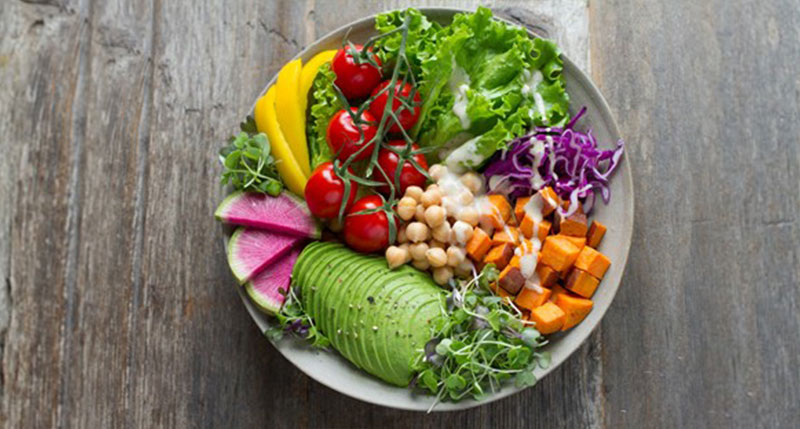As your parents always told you: You are what you eat. Science and research studies continue to confirm the fact that with every single bite or sip you put into your body, you’re either feeding or fighting disease.
For example, we know that whole foods, fruits, and vegetables are very good for the body while highly processed “junk foods” with additives and high sugar content are not. Scientific research can even tell us which specific nutrients and vitamins support good eye health. This information becomes more and more important to focus on as the birthdays pile up and age becomes a factor in eye health through risk for conditions including cataracts, glaucoma, and age-related macular degeneration.
No matter your age, one way to empower yourself in fighting diseases of the eye is to add the potent vitamins, minerals, and antioxidants to your diet that are shown to help improve visual acuity and support overall eye health.
The vision-friendly powerhouse nutrients—which include zeaxanthin, lutein, vitamins C and E, omega-3 fatty acids, and zinc—have even been shown to reduce your risk for developing some specific eye diseases, including cataracts and age-related macular degeneration.
So when planning your next meal or snack, consider how every bite you take either feeds or fights disease. And aim to choose foods that line up on the “fight disease” side of the equation. For your eyes, these foods include green leafy vegetables, other colorful vegetables, fresh fruits, nuts, and cold-water fish, including salmon and tuna.
Here are more specifics on these eye-supporting nutrients and how to incorporate more of them into your diet:
- Zeaxanthin and Lutein
Studies show that high levels of the carotenoids lutein and zeaxanthin (which give the orange and green color to veggies such as carrots and spinach) can reduce your risk for developing specific chronic eye diseases, including cataracts and macular degeneration. People who eat a lot of spinach, kale, pumpkin, and Brussels sprouts get high levels of these two nutrients, which have been shown to lower a person’s risk of developing new cataracts. According to My Food Data, the foods highest in lutein and zeaxanthin are: dark leafy green vegetables (spinach), green peas, summer squash, pumpkin, Brussels sprouts, broccoli, asparagus, Romaine lettuce, carrots, and pistachios. Yum! - Vitamin C
High levels of vitamin C in the eye’s lens are shown to protect the eye from oxidative damage caused by the sun’s ultraviolet rays, a known cause of cataracts. There is evidence to suggest that vitamin C may work to slow the development of cataracts and even lower the risk of developing cataracts. Additionally, when consumed along with other protective essential nutrients such as zeaxanthin and lutein, vitamin C may slow the visual acuity loss associated with age-related macular degeneration. According to Medical News Today, the foods highest in vitamin C include guava, sweet yellow or green peppers, tomato or orange juice, strawberries, papaya, broccoli and pineapple. - Vitamin E
Vitamin E is a protective resource for your eyes, fighting free radicals—the unstable molecules that piggyback their way into our bodies through pollution and toxins to break down and damage healthy tissue. According to My Food Data, the best food sources of vitamin E include sunflower seeds, almonds, avocados, spinach, kiwifruit, butternut squash, olive oil, and shrimp. - Omega-3 Essential Fatty Acids
Omega-3 fatty acids are essential for eye health, promoting proper visual development and good retinal function. In addition, omega-3 fatty acids may support a reduced risk of developing high eye pressure associated with glaucoma, and may provide relief of dry eye symptoms. Get more omega-3 fatty acids in your diet by consuming oily, cold-water fish, which includes salmon, anchovies, mackerel, tuna, sardines, and oysters. Not a seafood fan? Good news: nuts and seeds including walnuts, flaxseed, and chia seeds can also provide you with ample omega-3s. - Zinc
Zinc is a key element of good eye health because it plays a role in transporting vitamin A from the liver to your retina so that the eyes can produce melanin. Melanin is a pigment in the eyes that helps protect them from the sun’s damaging ultraviolet rays. Without enough zinc in your diet, your night vision may suffer, and you may have a higher risk for developing cataracts. According to Healthline, excellent sources of dietary zinc include meat, shellfish, legumes, nuts, seeds, dairy, eggs, and even dark chocolate!
Who knew fighting eye disease and protecting your vision with smart food choices could make such a delicious, colorful plate?
Whether you eat a rainbow of healthy foods or not, one critical factor in protecting your eye health is your annual comprehensive eye exam. Call us today to schedule yours—and please be sure to share with us how your eating habits are supporting good eye health!





